3. Conquest and Quarrels.
This class will consider how Britons have seen themselves reflected by looking across the Channel into the mirror of France.
For example, we talk of the Norman Conquest as a cataclysmic event, but in fact a modern Englishman can look back at Norman
civilization and see much that he recognizes: in social organization, in architecture and jurisprudence, even in language.
Hence the title of our first section, "Norman is the New Normal."
For over 400 years, however, from the Hundred Years' War through the Napoleonic Wars, France was in conflict with Britain,
whether engaging directly at either end of this period, or opposing one another via coalitions or proxies in the middle of it.
The constant threat of war has not only shaped British attitudes to France (generally uncomplimentary), but also brought out real
or supposed national characteristics that generations of Britons have rightly or wrongly embraced as defining truths.
But this is not a course, or class, about political history as such. Instead, we shall look at each period through a different
cultural lens: architecture and language for the Normans; the plays of Shakespeare for the Hundred Years' War; English, Scottish,
and French folk songs for the Eighteenth Century; and English Romantic poets for the French Revolution and Napoleon. rb.
The script, videos, and images will be posted immediately after class.
With the single exception of Henry VI (which I never got to play), all the clips are available on YouTube, though
sometimes with different images or none at all. Additionally, I have thrown in some more of the period music I used for
the Norman videos, the complete Olivier and Branagh films of Henry V plus their versions of some scenes shown from
the other, Catherine's English lesson (with Shakespeare making dirty puns in French!), the Agincourt Carol from the Hundred
Years' War, the Agincourt clip from the non-Shakesperean Netflix series The King, and a short documentary that
explains the Seven Years' War much better than I could. You will find a great deal more out there if you look. *Asterisked
items were not shown. rb.
| NORMAN IS THE NEW NORMAL |
| |
Bayeux Tapestry |
|
* Own video
(for music, see below)
|
| |
Durham |
|
* Narrated tour
(for music, see below)
|
| |
Carmina Burana |
|
* Selections
(11/12th-century music used in my videos)
|
| |
| SHAKESPEARE IN FRANCE |
| |
Agincourt Carol |
|
* 15th-century song
|
| |
Henry V, Olivier 1944 |
|
* Complete film
* Tennis balls scene
(Henry's reply only)
* Harfleur speech
* Agincourt
(longer sequence than shown in class)
* Wooing scene
(with Renée Asherson)
|
| |
Henry V, Branagh 1989 |
|
* Complete film
* Harfleur speech
* Agincourt speech
* Wooing scene
(with Emma Thompson)
|
| |
Henry V, RSC 2015 |
|
* Tennis balls scene
(Alex Hassell)
* Wooing scene
(Alex Hassell, Jennifer Kirby)
|
| |
Henry V, Catherine's English Lesson |
|
* Olivier film
(Renée Asherson, much of this in French!)
* Judi Dench
(a young Judi!)
|
| |
The King, Netflix 2019 |
|
* Agincourt sequence
(Timothée Chalamet, Robert Pattinson)
|
| |
German: Merrie England |
|
* The Yeomen of England
(Peter Dawson, audio)
|
| |
| FRENCH WARS IN FOLKSONG |
| |
Folk Songs |
|
* High Germany
* Malbrough s'en va-t-en guerre
* Wha'll be King but Cherlie?
* Skye Boat Song
(Apollo's Fire, with narration)
* Boney was a Warrior
( Paul Clayton—same singer, different video)
* Te souviens-tu?
|
| |
Outlander |
|
* Bonnie Prince Charlie montage
|
| |
The Seven Years' War |
|
* Documentary
(very clear historical summary)
|
| |
| REVOLUTION AND THE ROMANTICS |
| |
Wordsworth: The Prelude |
|
* Dawn of the Revolution
(audio with text)
* September Massacres
(audio, from Britten's Nocturne)
|
| |
Byron: Childe Harold's Pilgrimage |
|
* The Eve of Waterloo
(own video, Tyrone Power)
|
| |
Hardy |
|
* The Night of Trafalgar
(used for audio only)
|
| |
Newbolt |
|
* The Fighting Temeraire
(own video, Bart Wolffe)
|
| |
|
|
|
|
|
| IMAGES |
The thumbnails below cover the slides shown in class, though
there may be a few small discrepancies. Click the thumbnail to see a larger image.
Click on the right
or left of the larger picture to go forward or back, or outside it to close. |
 | |
 | |
 | |
 | |
 | |
 | |
 | |
 | |
 | |
 | |
 | |
 | |
 | |
 | |
 | |
 | |
 | |
 | |
 | |
 | |
 | |
 | |
 | |
 | |
 | |
 | |
 | |
 | |
 | |
 | |
 | |
 | |
 | |
 | |
 | |
 | |
Here are brief bios of the artists, composers, and writers considered in the class, listed in order of birth.
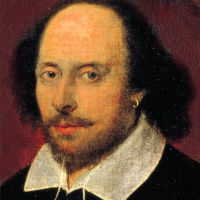 |
William Shakespeare, 1564–1616. English poet and playwright.
With almost 40 plays, 154 sonnets, and many longer poems, Shakespeare dominates English literature of his time, and world literature for ever after. To attempt a thumbnail biography would be both unnecessary and impossible.
|
 |
William Wordsworth, 1770–1850. English poet, critic, and philosopher.
With the joint publication of the Lyrical Ballads with Coleridge in 1798, Wordsworth co-founded the English Romantic movement, and continued to dominate it for decades with poetry of his native Lake District and his doctrine of capturing experience direct from Nature for later use as "emotion recollected in tranquility."
|
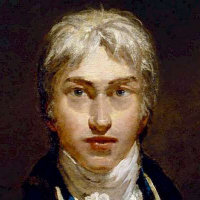 |
Joseph Mallord William Turner, 1775–1851. English painter.
Rivaled only by Constable, Turner was the dominant British landscape painter of the first half of the 19th century, he started his career with topographical views intended for engraving, and ended with works whose subjects were dissolved in veils of paint and light. His Fighting Temeraire (1838) was recently voted the Greatest British Picture in a BBC poll.
|
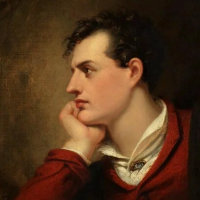 |
George Gordon, Lord Byron, 1788–1824. English poet.
Byron, an hereditary peer, was one of the leading poets of the Romantic age, and the one whose passions and unconventional lifestyle most clearly defined the Romantic Hero, especially among his admirers in France, Germany, and Russia. His long poems Don Juan and Childe Harold's Pilgrimage are epic in scope and show his characteristic combination of action and wit. He died in Greece at the age of 36, fighting in the Greek War of Independence.
|
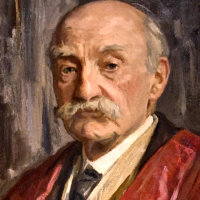 |
Thomas Hardy, 1840–1928. English novelist and poet.
Although thinking of himself primarily as a poet, Hardy is most often remembered as the author of pastoral realist novels set in "Wessex," his name for a large swath of Southwest England, the country that he loved. While Far From the Madding Crowd ends happily, more of his novels have an elegaic pessimism that is found also in his verse.
|
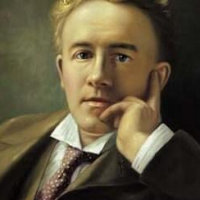 |
Edward German, 1862–1936. English composer.
Born German Edward Jones to a Welsh family in the West of England, he took his given names as a nom de plume when he began to achieve success as a composer of incidental music for the theater and light operas in the Gilbert-and-Sullivan vein, such as Merrie England (1902).
|
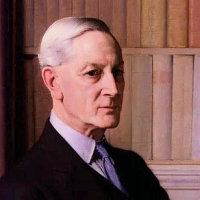 |
Henry Newbolt, 1862–1938. English writer and lawyer.
After studying at Clifton College and Oxford, Newbolt became a lawyer and practised as a barrister until 1899. He also worked for the government, producing the influential Newbolt Report on the teaching of English in 1921. He was knighted in 1915. He is best known, however, as the author of the once-popular patriotic poems "Vitai Lampada" and "Drake's Drum."
|
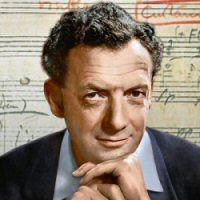 |
Benjamin Britten, 1913–76. English composer.
Arguably the leading opera composer of the mid-20th century, Britten's major operas have included Peter Grimes (1945), Billy Budd (1951), Gloriana (1953), A Midsummer Night's Dream (1960), and Death in Venice (1973), plus many stage works for smaller forces. He was equally active as a composer of instrumental music and text settings, and latterly as a conductor and accompanist.
|












































